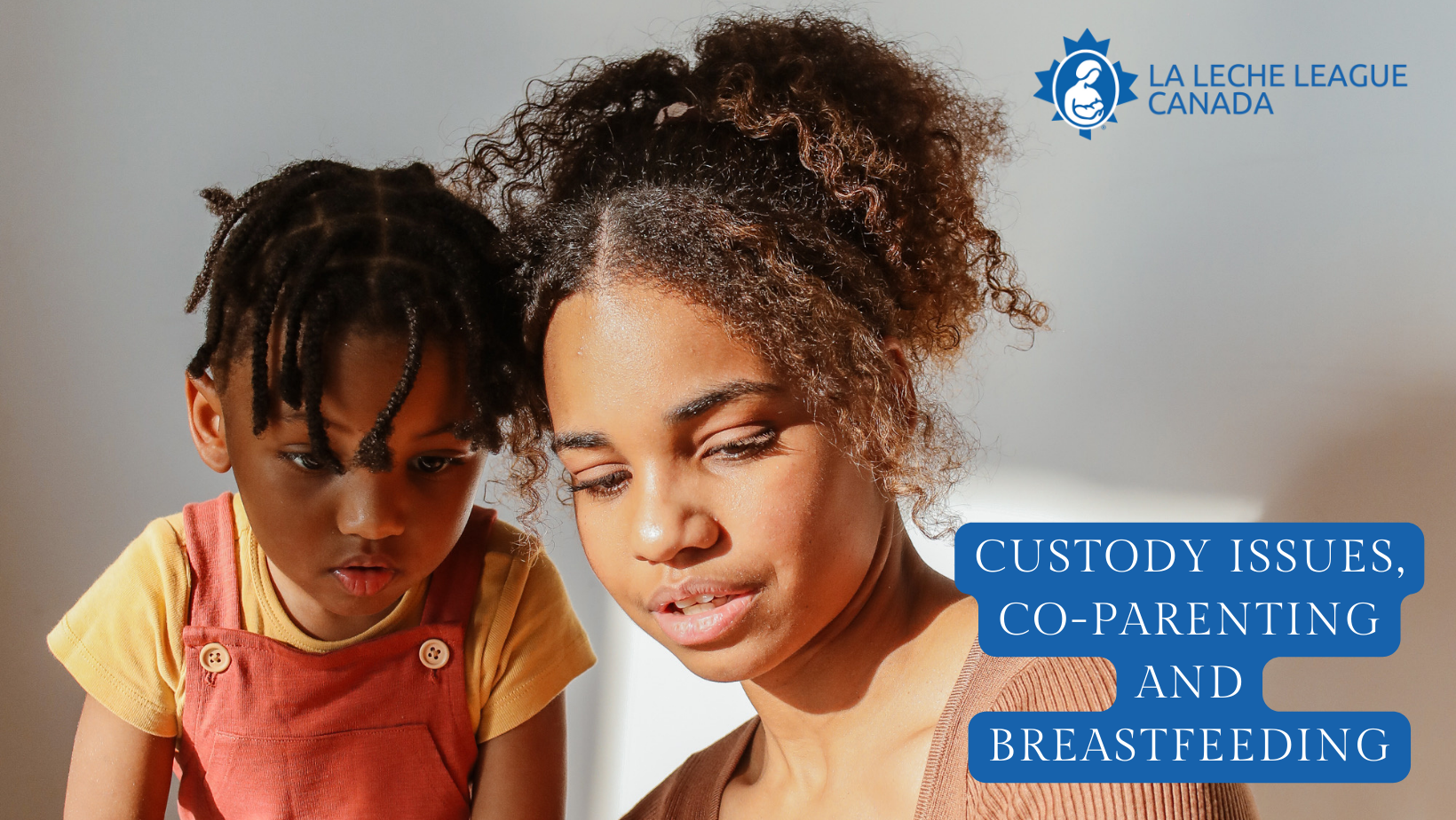
Attachment for a developing child begins with their primary parent, usually the mother, and is enhanced by a nursing relationship. Attachment to the father, or non-nursing parent, is also critical, and builds upon the primary attachment. Care must be taken by both parents to protect and nurture this developmental process. Disruption of the attachment process can be harmful to the child’s ability to grow trusting and healthy attachments with both parents.
IN THE BEST INTERESTS OF THE CHILD
Courts in Canada are expected to make decisions that they feel are “in the best interests of the child.” This includes regular and meaningful access to both parents. It will be important for you to document your child’s normal routine and identify the frequency and intensity of their need for comfort, security and closeness with you both during the day and in the night time.
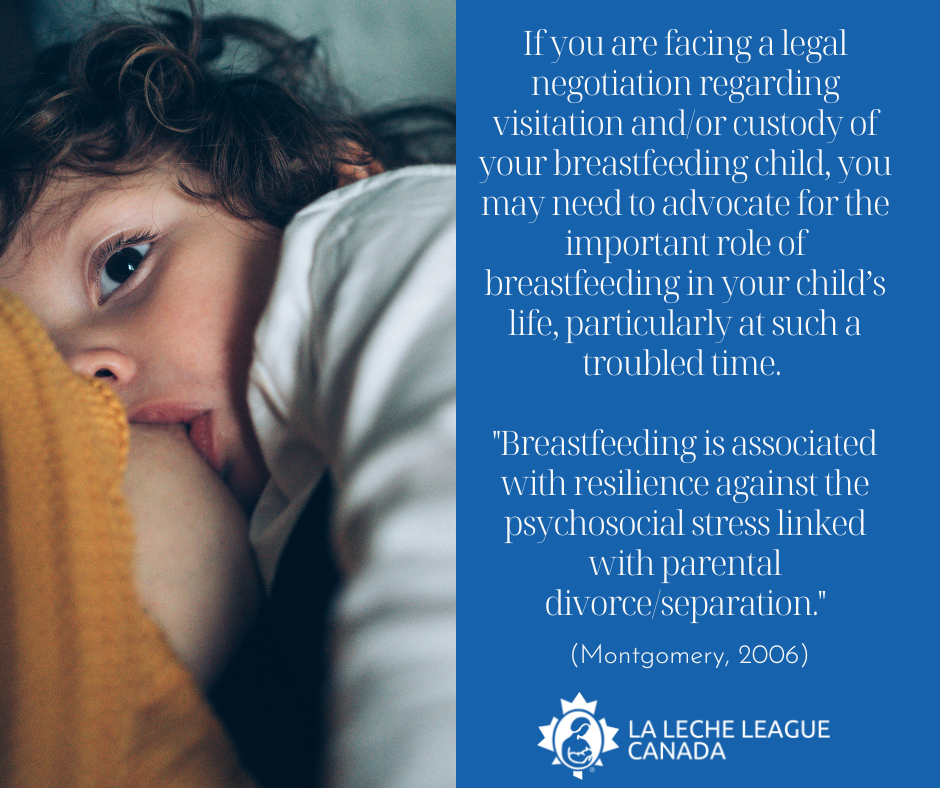
It will be in the best interests of the child to have as little disruption of normal routines as possible, particularly in the beginning. With understanding and positive intention, the child’s unfolding relationship with the father, or non-nursing parent, can be maintained, developed, and deepened without endangering the child’s need for stability or the child’s need for their mother. As the child grows, and resilient attachment relationships develop, new routines, including longer separations, will be better accepted. Breastfeeding will become less and less of an integral component of the mother/child relationship, while the relationship with the father, or other parent, continues to evolve. This emotional development cannot be hurried without negative consequence for the child.
If you try to argue that your child needs to be with you because of the benefits of your milk, you may find that the court simply suggests that you provide your pumped milk for the child’s other parent. There is precedent for this approach by the courts, so work carefully with your lawyer on how best to proceed so your child’s needs and rights are protected (United Nations, 1989).
When there is planned separation for the child from their more familiar environment, it is important to create a schedule that is as close as possible to what the child is accustomed to. Any changes should be made gradually to minimize disruption to the child. If your child is currently co-sleeping and nursing it will be particularly important that any changes to this arrangement be made slowly, at a pace that allows the child to develop and adapt. It is helpful to have a workable plan to present to the court that allows access to both parents, while still protecting breastfeeding, for as long as breastfeeding remains an important component of the child’s relationship with their mother.
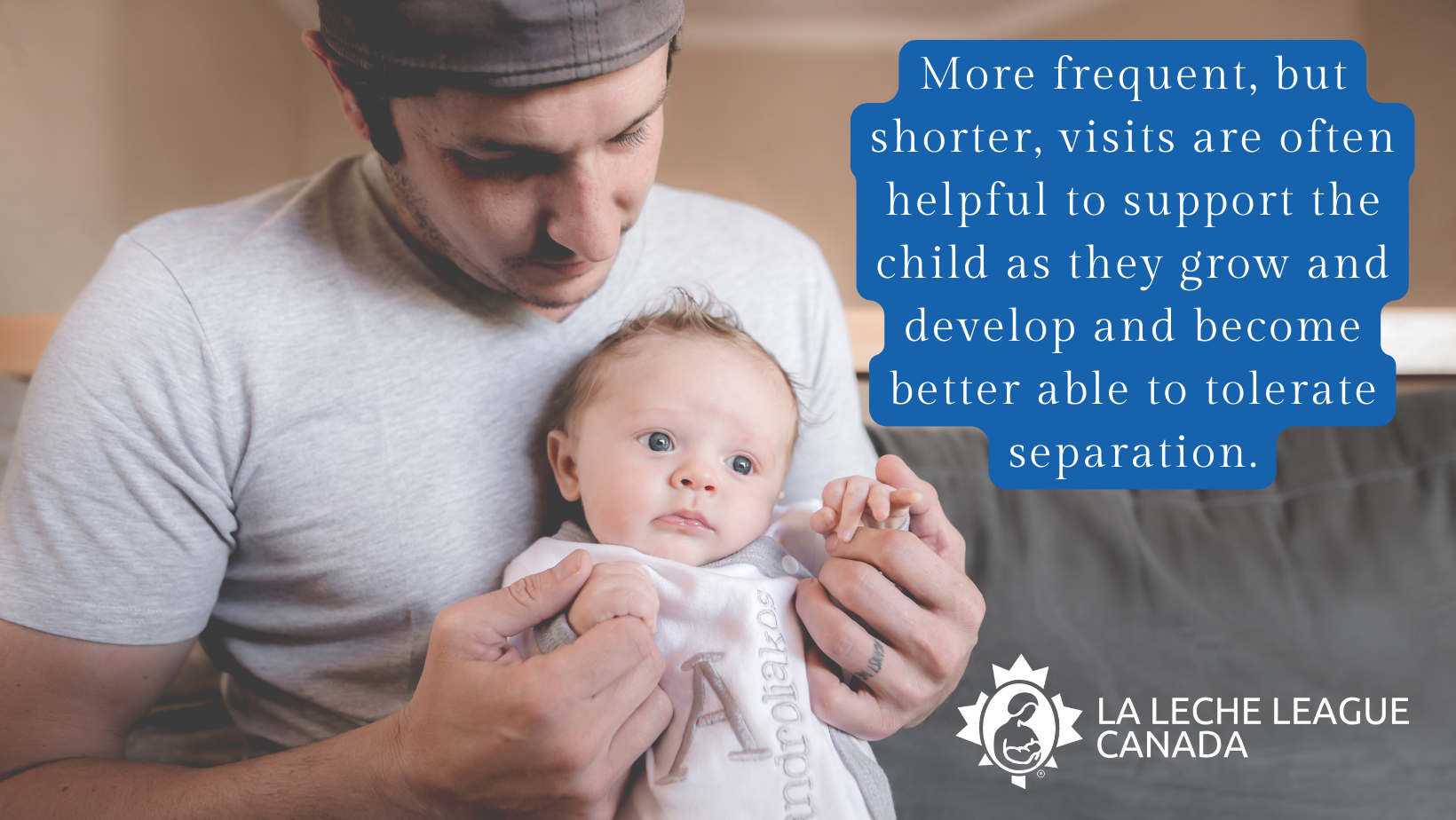
ACCESS TO THE CHILD
It is important that at no point does the primary caregiver deny access of the other parent to the child. The courts are strongly opposed to this behaviour. If you fear harm to or abduction of the child, consult with your lawyer and/or the police. If you deny access to the child, and the court is not convinced that there is a credible threat of harm, this could negatively affect your case.
The other parent may argue that you are denying access if you do not allow lengthy or overnight visits. This is not "denying access”. It is protecting the child’s need for continuity and familiar routines and contributes to the child’s development of trust.
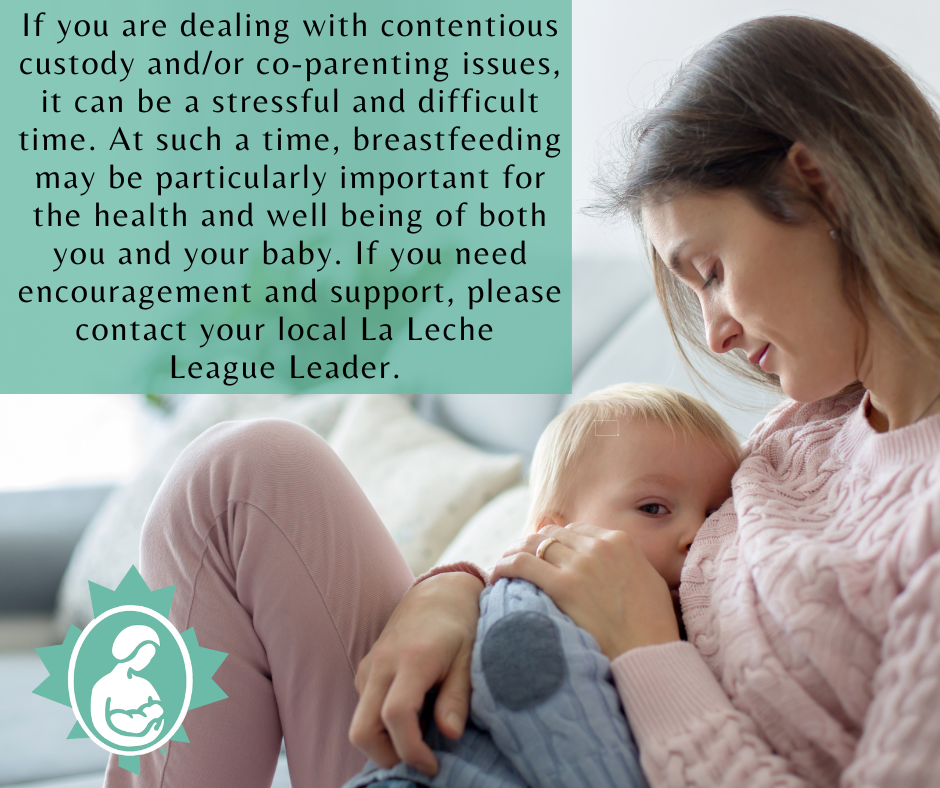
MAINTAINING BREASTFEEDING DURING SEPARATION FROM YOUR CHILD
Some may suggest that weaning will solve your problems. But weaning may add unnecessary stress and anxiety for the child. You do not have to wean in order to comply with any court-ordered visitation requirements. You can continue to nurse when you and your child are together as long as you and your child want.
Any unusual or unexpected separation can be disruptive for a young child, especially one that is struggling to adapt to a major change in the family structure and dynamics. If the parents observe that the nursing relationship is adversely affected by separation time, length or frequency, they can adjust the separations to better support the needs of the child. Disruptions may still occur, and in that event, the following can be helpful:
- During any separation that includes missing a usual breastfeeding time, it is important to express your milk to keep up your supply. (Contact an LLLC Leader for support and information.)
- When your child first returns home from a separation, make the transition easier on both of you by being available and responsive, while giving your child time to adjust and re-orient themselves.
- Sometimes your child may seem confused or may be reluctant to nurse like their usual pattern; be patient, spend time cuddling skin to skin or just being together.
- Your child may nurse more frequently; give him/her the time s/he needs to reconnect with you. This will be a time of adjusting to being together again.
If you are dealing with contentious custody and/or co-parenting issues, it can be a stressful and difficult time. At such a time, breastfeednursing may be particularly important for the health and well being of both you and your baby. If you need encouragement and support, please contact your local La Leche League Leader.
Major disruptions to the child’s familiar routines and comfort seeking behaviours, such as breastfeeding, can strain the child’s trust in their parents. Trust vs distrust is the most important developmental objective in infancy as defined by Eric Erikson (Chirban, 2016). This stage is a building block that is crucial to maturation across the entire span of the child’s life. If the child is not yet developmentally ready for lengthy overnight stays, you can offer short visits between feedings, everyday or every other day while custody is being negotiated. In the best interest of the child, both parents must understand that social and psychological development takes time, and empathetic observation of the child tells them if and when the child is ready for longer separations.
If you are concerned, for any reason, that unsupervised visitation is not safe, then consult with your lawyer and/or the police.
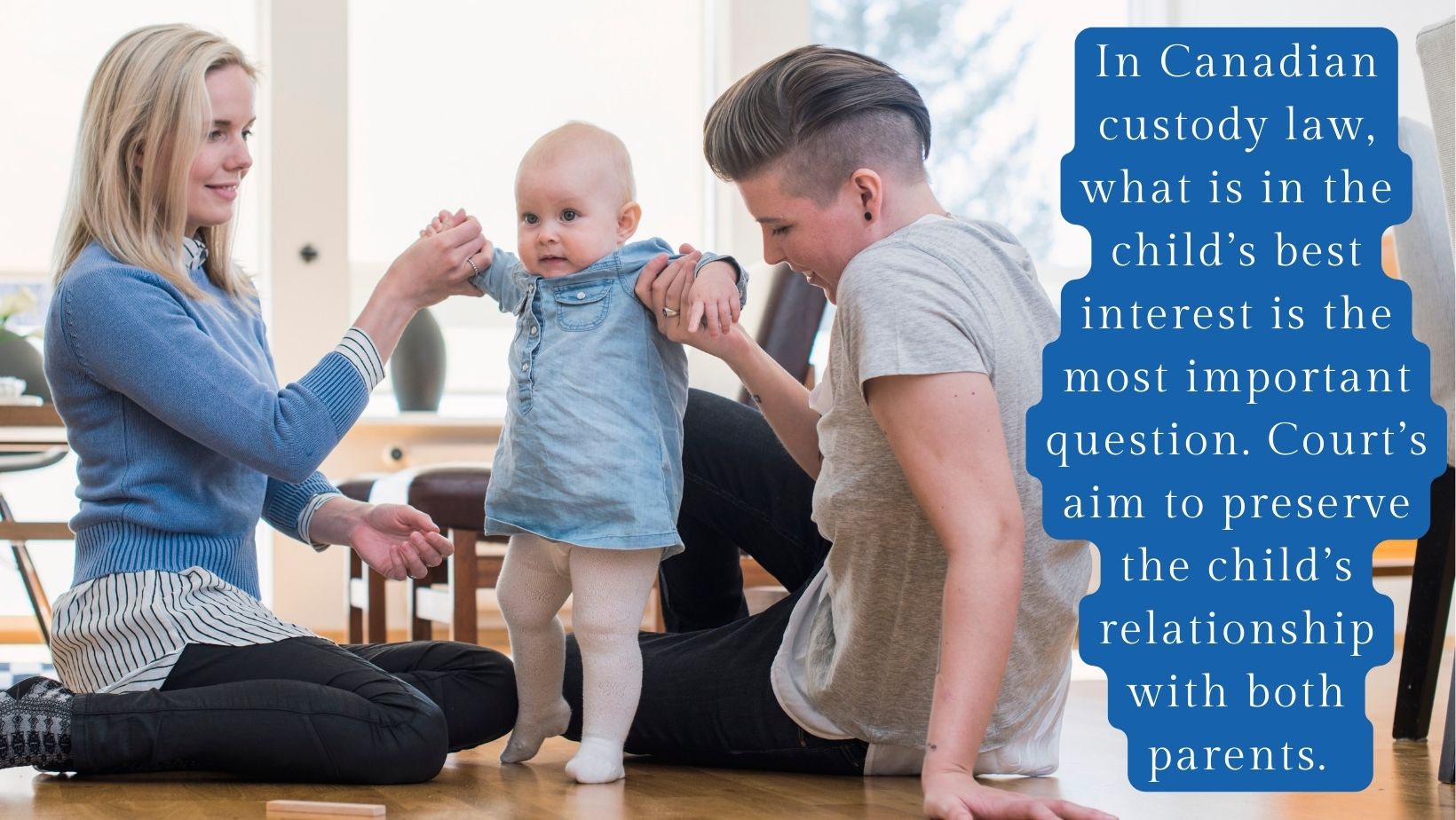
CREATING A CUSTODY/VISITATION PLAN
Any custody plan will require your child to spend at least some time away from you. Compromise will be required. The final plan may involve more hours away than you feel your child can handle. This compromise may be necessary in order to avoid even longer separations. It is important to remember that in Canadian custody law, what is in the child’s best interest is the most important question. Courts aim to preserve the child’s relationship with both parents. It helps to enter the discussions prepared with a plan that provides for increasing time between your baby or child and your former partner as your child grows and matures.
Tips for Creating a Visitation Plan
- Write down your plan and be prepared to be flexible in negotiations.
- Make it clear that you are not opposed to visitation and that you want your child to have a good relationship with both parents.
- Point out that you understand (or accept) that the visitation arrangements will change as the child matures and is better able to tolerate longer separations. Stress that starting with shorter, more frequent visits, will help the child adapt to the changing family dynamics.
- Consider preparing an affidavit supporting your position. As the exact format can vary by location, seek legal advice to ensure your affidavit conforms to local requirements.
See the Resources section at the end of this document for more information to help you create a plan.

Mediation is a non-binding negotiation between the two parents by a neutral, trained mediator. It can be a helpful option instead of going to court, and is much less expensive. The child benefits in many ways from having parents who are collaborating and looking for solutions rather than battling with each other. Creativity, flexibility, and negotiation are key.
Arbitration is a binding decision-making process. The arbitrator acts like a judge and makes a final decision on the issue at hand. It is unusual for a judge to overturn the decision of an arbitrator so make sure you are fully informed about the implications of arbitration before agreeing to it.

If you decide you need a lawyer, you will want to find someone who respects and understands your views on breastfeeding and parenting. Your lawyer should be willing to learn more about breastfeeding, separation and normal child development. Let your lawyer know that you expect him/her to be willing to call expert witnesses, if appropriate. These witness might be necessary to:
- support your suggested plan for visitation or
- challenge a plan being recommended by your partner or the court.
Possible expert witnesses may be:
- Doctor or Psychiatrist
A family doctor can provide a statement explaining and supporting the loving relationship between you and your child, and how nursing plays an important role in that relationship. This statement can also clarify why lengthy separations are undesirable for this child at this time. If your own doctor will not do this, find another doctor (or psychiatrist) who has more knowledge of child development, breastfeeding and mothering and who is willing to help you. - Child Psychologist
A statement from a child psychologist/psychiatrist is helpful if your nursing child is over a year old, or has recently weaned. Find someone who can discuss the separation issues and show that lengthy separation from you, as well as from breastfeeding, could be detrimental to the child’s emotional health. Be prepared that those opposing you may bring forward other experts who say otherwise. - International Board Certified Lactation Consultant (IBCLC) https://iblce.org/
An IBCLC can explain the normal course and physiology of breastfeeding and how frequent or lengthy separations can interfere with lactation and lead to premature weaning from the breast. They can comment on the interactions between you and your child.
You will want your lawyer to pursue every possible way to provide custody or visitation arrangements compatible with your child’s needs. Not all lawyers are experienced in arguing cases like this. It is helpful to get excellent legal counsel to start your case off right. Depending on your situation, you may see more than one judge throughout your custody case. If a judge you see early on gives prolonged access to the non-nursing parent, it may be difficult for you to return to shorter, more frequent visits with a subsequent judge. Your early court hearings are very important.
Babies who do not receive human milk have a documented increased risk of:
- respiratory infections
- ear infections
- digestive diseases
- eczema
- diabetes
- childhood leukemia
- meningitis
- necrotizing enterocolitis
- obesity
- SIDS
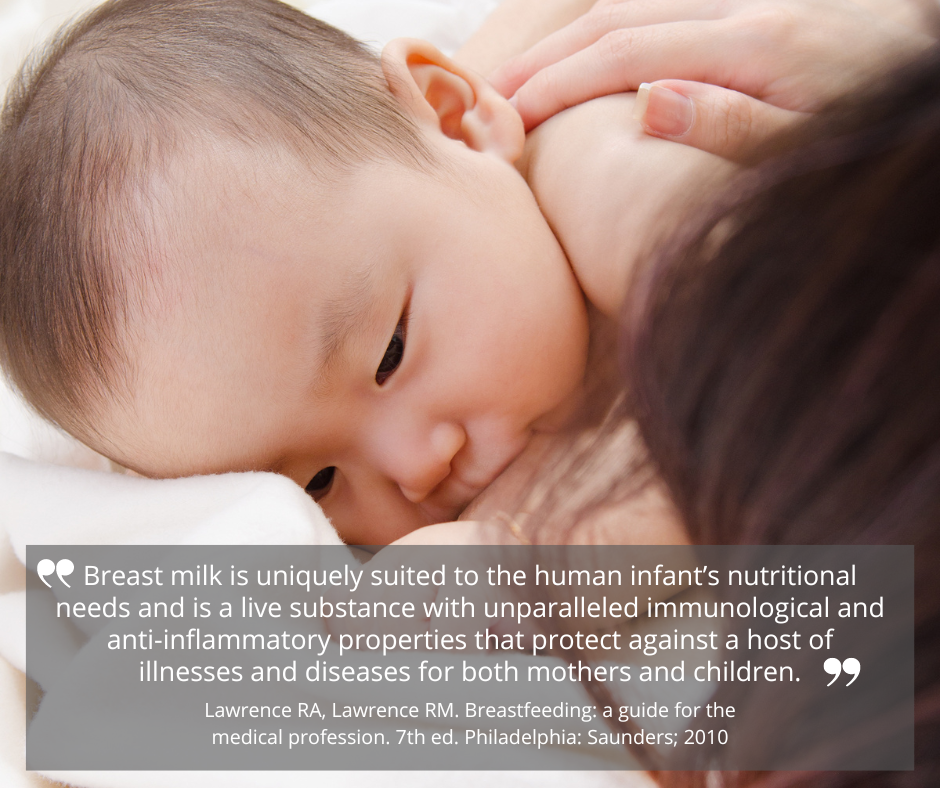
These health benefits are dose-related. The longer a child breastfeeds, the lower the risk of the above illnesses.
The age of your child and the frequency of nursing should be considered when establishing a custody agreement. Lengthy separation from you, as well as from breastfeeding, could be detrimental to his/her emotional and physical health. “In addition to being a critical source of nutrition to the infant, research shows that breastfeeding is not simply a meal at the breast but also has significant and far-reaching effects on cognition, behavior, and mental health in children and mothers.” (Krol, 2018).
RESOURCES
Resources on the Importance of Breastfeeding
- La Leche League Canada
Amazing Milk (importance of breastfeeding for children)
Importance of Breastfeeding for Women's Health - Health Canada
Nutrition for healthy term infants: Recommendations from birth to six months - A joint statement of Health Canada, Canadian Paediatric Society, Dietitians of Canada, and Breastfeeding Committee for Canada
Nutrition for Healthy Term Infants: Recommendations from Six to 24 months - A joint statement of Health Canada, Canadian Paediatric Society, Dietitians of Canada, and Breastfeeding Committee for Canada
Breastfeeding Your Baby (health benefits for mothers) - United Nations
United Nations General Assembly Resolution: Convention on the Rights of the Child. (1989). Office of the United Nations High Commissioner for Human Rights.
(Canada is a signatory of this resolution, which gives this document the weight of law in Canada. Article 24.1 “States Parties recognize the right of the child to enjoyment of the highest attainable standard of health …” Article 24.2 "States Parties shall pursue full implementation of this right and, in particular, shall take appropriate measures: (a) “To diminish infant and child mortality;” and (g) “To ensure that all segments of society, in particular parents and children, are informed, have access to education and are supported in the use of basic knowledge of child health and nutrition, the advantages of breast-feeding, hygiene and environmental sanitation and the prevention of accidents:".)
Resources for Creating Custody/Visitation Plans
- Government of Canada
Parenting arrangements after separation or divorce
Creating a Parenting Plan - From the Association of Family and Conciliation Courts of Ontario
Parenting Plan Guide (2020) - Provincial and Territorial Human Rights agencies of Canada
- Chang, Kelly.
Breastfeeding, Custody, Divorce and Fathers. Law and Mediation Services of Kelly Chang.
(Helpful information from a family lawyer in California who is familiar with representing breastfeeding mothers. Also gives very helpful sample visitation plans.) - Gribble, K.D., PhD. (2021). Writing Expert Reports for Court in Relation to Breastfeeding Infants and Young Children. Journal of Human Lactation, 37(4): 683-688
(Dr. Gribble is an IBCLC and has written several letters to courts in support of breastfeeding for the child. This article contains excellent references that support continued breastfeeding.) - Bonnell, Karen (2017). The Co-Parenting Handbook: Raising Well-Adjusted and Resilient Kids from Little Ones to Young Adults through Divorce or Separation (2017).
Resources on the Impact of Separation on Childhood Development
- Chirban, J.T., Ph.D, Th.D. (Dec 16, 2016). Does Divorce Damage Infants and Toddlers: How to minimize the impact of divorce on infants and toddlers. Psychology Today.
(Dr. Chirban is a clinical instructor in psychology at Harvard Medical School.) - Krol, K.M., Grossmann, T. (August 2018). Psychological effects of breastfeeding on children and mothers. Bundesgesundheitsblatt Gesundheitsforschung Gesundheitsschutz 61(8):977-985
- Mcintosh, J.E., Smyth, B.M., and Kelaher, M. (2013) Overnight care patterns following parental separation: Associations with emotion regulation in infants and young children, Journal of Family Studies, 19(3), 224-239
(“A relationship between higher number of overnight stays and emotional dysregulation indices was evident for infants 0–1 years and children 2–3 years.”... “This study offers some markers of developmental strain in the infant and young child, that may assist parents, judges and mediators in their evaluation of a very young child’s response to shared over-night time between parents.”) - McIntosh, J.E., Booth, A.T. (2021). Special Considerations for Infants and Toddlers in Separation/Divorce: Developmental Issues in the Family Law Context. Encyclopedia on Early Child Development.
(This is a Canadian organization, supported by the Canadian government.) - Montgomery S.M., Ehlin A., Sacker A. (2006). Breast feeding and resilience against psychosocial stress. Archives of Diseases in Childhood. 91:990-994.
- Pearson-Glaze, P., IBCLC. (Jan 11, 2023). Custody and Breastfeeding. Breastfeeding Support.
(Informative article with international resources from an IBCLC in England. She quotes Dr Jack Newman who is a world-recognized doctor in the field of lactation in Toronto.)
Updated 2024
